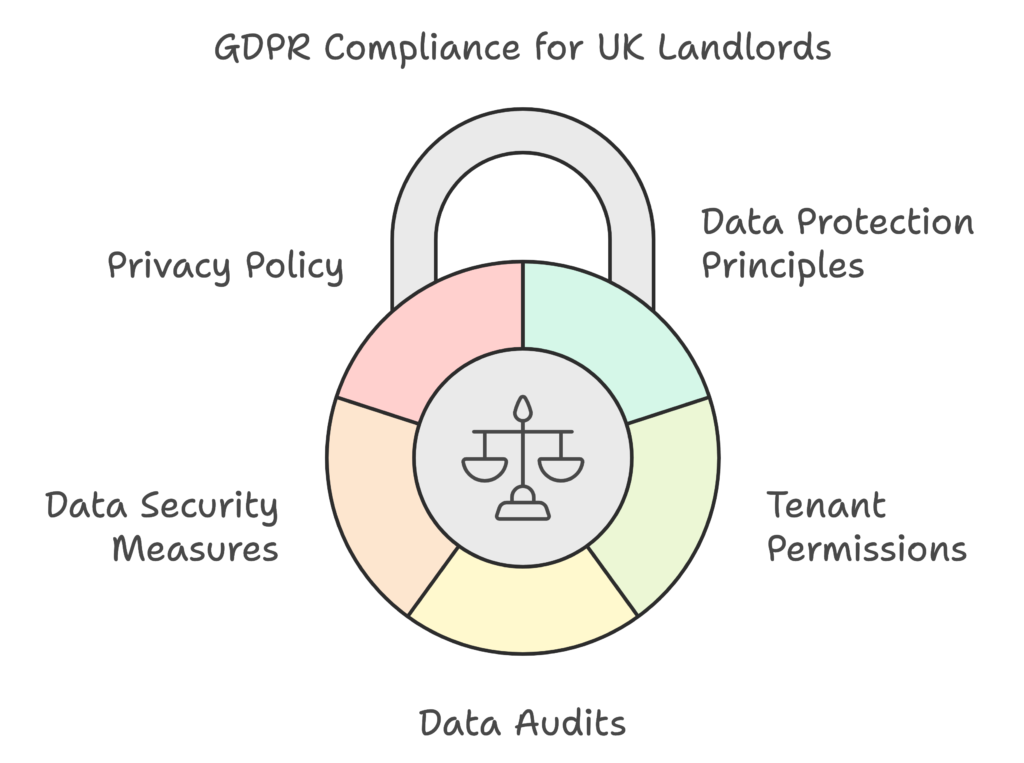A Guide to GDPR Compliance for UK Landlords
Summary of Key Takeaways
- Understanding GDPR is essential for UK landlords to protect tenant data and ensure legal compliance.
- Data protection principles must be strictly followed, ensuring lawful processing of personal information.
- Tenant permissions are required for any installations or data processing activities within rental properties.
- Conducting a thorough data audit helps identify and manage personal data effectively.
- Implementing robust data security measures safeguards against breaches and unauthorized access.
- Creating a clear and comprehensive privacy policy builds trust with tenants and ensures transparency.
- Registering with the ICO is mandatory for landlords processing data electronically.
- Regular GDPR training and audits help maintain ongoing compliance and mitigate risks.
- Efficiently managing data subject requests is a legal obligation under GDPR.
- Non-compliance consequences can include significant fines and reputational damage.

1. Introduction to GDPR for Landlords
Understanding the General Data Protection Regulation (GDPR) is crucial for every UK landlord. GDPR is a comprehensive data protection law originally governed by the Data Protection Act 1998. Despite the UK leaving the European Union, it continues to uphold the principles set out under GDPR, ensuring consistent data protection standards.
As a landlord, you handle various personal information from tenants, such as names, contact details, and financial records. Ensuring compliance with GDPR helps protect this data from misuse and breaches, fostering trust between you and your tenants.
Non-compliance with GDPR can lead to hefty fines and legal consequences. Therefore, it’s imperative to grasp the fundamentals of GDPR to maintain a secure and reputable rental business.
2. What is GDPR and Its Importance for Landlords
GDPR, or the General Data Protection Regulation, aims to strengthen and unify data protection for individuals within the EU and the UK. It gives control back to citizens and residents over their personal data while simplifying the regulatory environment.
Key Objectives of GDPR
| Objective | Description |
|---|---|
| Control Over Personal Data | Empowers individuals to manage how their data is used and shared. |
| Unified Regulation | Harmonizes data protection laws across the EU and UK for consistency. |
| Enhanced Privacy Rights | Expands the rights of individuals regarding their personal information. |
| Accountability | Requires businesses to demonstrate compliance through documentation. |
For landlords, GDPR ensures that tenant information is handled with utmost care, enhancing trust and legal compliance. Adhering to GDPR principles helps protect both your business and your tenants from potential data breaches and misuse.

3. Key GDPR Principles for Landlords
GDPR is built around several core principles that dictate how personal data should be handled. These principles ensure that data is processed lawfully, fairly, and transparently.
Overview of GDPR Principles
| Principle | Description |
|---|---|
| Lawfulness, Fairness, and Transparency | Data must be processed legally, ethically, and transparently, ensuring tenants know how their data is used. |
| Purpose Limitation | Data should be collected for specific, legitimate purposes and not used beyond those initial purposes. |
| Data Minimization | Only the necessary data required for the purpose should be collected and processed. |
| Accuracy | Ensuring that personal data is accurate and kept up to date. |
| Storage Limitation | Data should not be kept longer than necessary for the intended purpose. |
| Integrity and Confidentiality | Data must be processed securely to prevent unauthorized access or breaches. |
| Accountability | Landlords must be able to demonstrate compliance with GDPR principles. |
Applying GDPR Principles
As a landlord, adhering to these principles involves carefully managing tenant data, ensuring that you only collect what is necessary, keeping it accurate, and securing it against unauthorized access. Regularly reviewing your data processing activities helps maintain compliance and protect tenant information effectively.
4. Performing a Data Audit
A comprehensive data audit is the first step towards GDPR compliance. It involves identifying all personal data you collect, how you use it, and ensuring it aligns with GDPR principles.
Steps to Conduct a Data Audit
- Identify Collected Data: List all types of personal data you hold, including tenant details, financial records, and any special category data.
- Assess Data Usage: Determine how and why each piece of data is used in your business operations.
- Evaluate Lawful Basis: Establish the lawful basis for processing each type of data, such as contractual necessity or legal obligation.
- Review Data Security: Assess the measures in place to protect the data from unauthorized access or breaches.
- Document Findings: Keep a detailed record of your audit findings to demonstrate compliance during inspections.
Data Audit Example for Landlords
| Data Type | Purpose | Lawful Basis | Storage Duration |
|---|---|---|---|
| Names and Contact Details | Communication with tenants | Contractual necessity | Duration of tenancy + 12 months |
| Financial Records | Rent payment processing | Legal obligation | Duration of tenancy + 6 years |
| Proof of Identity | Right to rent checks | Legal obligation | Duration of tenancy + 12 months |
| Employment Details | Assessing tenant reliability | Legitimate interest | Duration of tenancy + 12 months |
| Credit History | Evaluating financial stability | Legitimate interest | Duration of tenancy + 12 months |
Conducting regular data audits ensures that you remain aware of the data you handle and maintain compliance with GDPR standards.
5. Creating a Privacy Notice
A clear and comprehensive privacy policy is essential for informing tenants about how their data is collected, used, and protected. This transparency builds trust and ensures compliance with GDPR.
Components of a Privacy Notice
| Component | Description |
|---|---|
| Data Collection | Details on the types of personal data collected and the purpose behind each collection. |
| Lawful Basis for Processing | Explanation of the legal grounds for processing each type of data, such as contractual necessity or legal obligations. |
| Tenant Rights | Information on tenants’ rights under GDPR, including access, rectification, and erasure of their data. |
| Contact Information | Contact details for tenants to reach out with questions or requests regarding their data. |
| Data Sharing | Disclosure of any third parties with whom data is shared, such as agents or contractors, and their data protection practices. |

6. Registering with the ICO
If you process personal data electronically, registering with the Information Commissioner’s Office (ICO) is mandatory. This ensures that you comply with GDPR regulations and demonstrates your commitment to data protection.
How to Register
- Determine Necessity: Confirm if you process personal data electronically, including through computers, cloud services, or other digital systems.
- Gather Information: Prepare details about your data processing activities, including the types of data handled and security measures in place.
- Complete Registration: Visit the ICO registration page and complete the registration form.
- Pay the Fee: Depending on your business size, pay the applicable annual fee. For micro organizations with an annual turnover below £632,000, the fee is £40.
Importance of Registration
Registering with the ICO not only ensures legal compliance but also provides access to valuable resources and guidance on data protection best practices. It serves as a foundation for building a robust data protection strategy within your rental business.
7. Tenant Permissions for Installations
Before initiating any installations or modifications within a rental property, obtaining explicit tenant permission is mandatory. This ensures that tenants are aware of and consent to any changes that may affect their privacy or the use of their personal data.
Importance of Consent
Consent must be freely given, specific, informed, and unambiguous. Clearly explain the purpose of the installation and how it may involve processing tenant data, such as installing smart devices that collect usage information.
Documenting Consent
Maintain records of all consent forms and communications with tenants regarding installations. This documentation is crucial for demonstrating GDPR compliance during audits and protecting your business in case of disputes.
Revoking Consent
Ensure that tenants have the option to withdraw their consent at any time. Provide clear instructions on how they can revoke permission if they choose to do so, and respect their decision promptly.
8. Consequences of Non-Compliance
Failing to adhere to GDPR can lead to severe consequences for landlords, both financially and reputationally. Understanding these risks underscores the importance of maintaining compliance.
Financial Penalties
GDPR violations can result in hefty fines, potentially reaching up to £17.5 million or 4% of your annual global turnover, whichever is higher. These penalties can significantly impact your business operations and financial stability.
Legal Repercussions
Non-compliance may lead to legal actions from tenants, including lawsuits and compensation claims. Protecting tenant data is not just a legal requirement but also a moral obligation to ensure their privacy and security.
Damage to Reputation
Data breaches and non-compliance incidents can tarnish your reputation, leading to loss of trust and potential loss of future tenants. Maintaining GDPR compliance helps uphold your reputation as a responsible and trustworthy landlord, essential for long-term business success.
Frequently Asked Questions
1. What is GDPR and why is it important for landlords?
GDPR stands for General Data Protection Regulation. It is a comprehensive data protection law that governs how personal data is collected, processed, and stored. For landlords, GDPR is crucial because it ensures the protection of tenant information, fosters trust, and helps avoid legal penalties.
2. What types of personal data do landlords typically handle?
Landlords usually handle personal data such as names, contact details, financial information, rental history, and sometimes sensitive information like employment details. It’s essential to protect all this data to comply with GDPR.
3. How can landlords obtain consent from tenants for data processing?
Consent should be freely given, specific, informed, and unambiguous. Landlords can obtain consent through clear written agreements, ensuring tenants understand what data is being collected, why it’s needed, and how it will be used.
4. What are the tenant’s rights under GDPR?
Tenants have several rights under GDPR, including the right to access their data, request corrections, demand deletion, restrict processing, and data portability. Landlords must facilitate these rights respectfully and promptly.
5. How should landlords secure tenant data?
Data security can be ensured through both physical and digital measures. Physical data should be stored in locked cabinets with restricted access. Digital data should be encrypted, password-protected, and stored on secure servers with regular backups and updates.
6. What steps should landlords take in case of a data breach?
In the event of a data breach, landlords must notify the Information Commissioner’s Office (ICO) within 72 hours if there’s a risk to tenants’ rights and freedoms. Additionally, affected tenants should be informed promptly to take necessary actions to protect themselves.
7. Are there any exemptions to GDPR for landlords?
GDPR applies to all landlords handling personal data related to tenancy. However, certain exemptions may apply to anonymized data or data processed for purely personal or household activities. It’s advisable to consult with a legal expert to understand specific exemptions.
8. How often should landlords review their GDPR compliance?
Regular reviews are essential to maintain GDPR compliance. Landlords should conduct annual audits, especially after significant changes to data processing activities, to ensure all practices align with current regulations.
Key Takeaways
- GDPR compliance is essential for protecting tenant data and maintaining trust.
- Understanding and adhering to GDPR principles ensures lawful data processing.
- Performing a data audit helps identify and manage personal data effectively.
- Obtaining tenant consent for any installations or data processing activities is mandatory.
- Implementing strong data security measures safeguards against breaches and unauthorized access.
- Creating a clear and comprehensive privacy policy communicates data handling practices to tenants.
- Registering with the ICO is necessary for landlords processing data electronically.
- Regular training and audits help maintain ongoing compliance with GDPR.
- Efficiently managing data subject requests is a legal obligation under GDPR.
- Non-compliance can lead to significant financial penalties and damage to your reputation.
This guide aims to provide comprehensive insights into GDPR compliance for UK landlords. By following the outlined principles and practices, landlords can ensure the protection of tenant data and maintain a reputable rental business.




